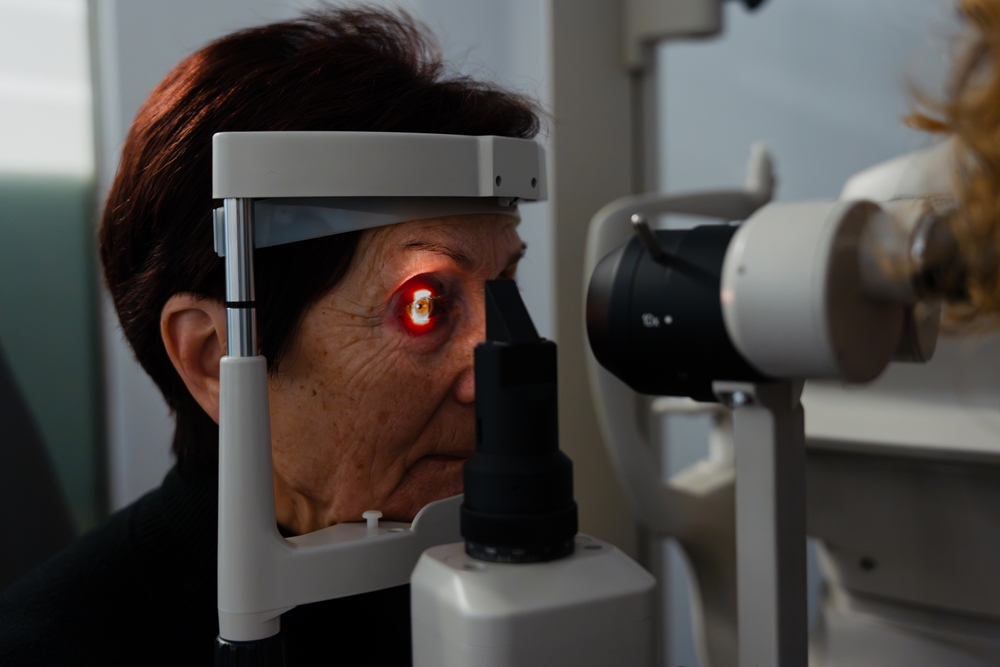Posted by: North Georgia Eye Associates in Uncategorized

Glaucoma is a very common age-related eye condition. It’s also the leading cause of blindness in adults over the age of sixty.
While glaucoma can cause permanent damage to your vision, it is treatable. However, it’s also hard to detect on your own, as it has no early symptoms.
Once vision is lost due to glaucoma, there is no way to regain that lost vision. This is why glaucoma is often called the “Silent Thief of Sight.”
The best way to prevent permanent vision loss from glaucoma is to have regular eye exams, especially if you have a family history. Early diagnosis and management is the most effective way to preserve your vision for years to come.
The first step towards an early diagnosis is awareness. Keep reading to learn more about how glaucoma affects your eye health and why regular eye exams can potentially save your vision!
What is Glaucoma?

Glaucoma is actually the name given to a group of eye diseases that all cause damage to the optic nerve. Your optic nerve is what connects your eye to your brain, allowing your brain to receive information about what you’re seeing.
When it becomes damaged, your brain isn’t able to receive the signals the retina is sending. The more damaged it becomes, the less and less you’re able to see.
In almost all cases, glaucoma is caused by a buildup of intraocular pressure (IOP). This can occur when the fluid that your eyes create isn’t able to drain properly.
Open-Angle Glaucoma
Open-angle glaucoma is the most common type of glaucoma. For those with this type of glaucoma, the angle created by the gap between your cornea and iris is open.
However, the network of smaller drainage channels further in the drainage pathway in the eye, called the trabecular meshwork, becomes blocked off. This causes a very slow rise in IOP that can go unnoticed for years.
Eventually, without treatment, the increased pressure can cause damage to the optic nerve and permanently change your vision.
Angle-Closure Glaucoma
Angle-closure glaucoma is much rarer than open-angle glaucoma. However, it can cause vision loss much more rapidly, so it’s essential to know about.
Angle-closure glaucoma occurs when the angle of the eye becomes extremely narrow or closed, blocking the fluid from flowing naturally through the drainage channels. This causes a much faster rise in IOP and is often considered a medical emergency that requires immediate treatment.
What Are The Most Common Symptoms of Glaucoma?
Open-angle glaucoma doesn’t have any symptoms in the early stages. The first symptoms occur when the optic nerve has already been significantly damaged.
These symptoms begin with loss of peripheral vision, and as the optic nerve becomes more damaged, your vision will begin to tunnel. Angle-closure glaucoma does have some very clear symptoms, including blurred vision, severe eye pain, headache, nausea, and vomiting.
If you experience these symptoms, seek emergency medical care immediately.
Fast treatment is needed to relieve the high eye pressure, so your optic nerve doesn’t become damaged.
In all cases of glaucoma, it’s important to remember that damage to the optic nerve cannot be fixed. Any vision lost to glaucoma can never be regained.
This is why it’s important to know your risk for glaucoma and have regular eye exams so it can be diagnosed and treated before permanent vision loss occurs.
Am I At Risk For Glaucoma?
You may be at a higher risk for glaucoma if you:
- Are over fifty-five
- Have diabetes
- Have high blood pressure
- Use corticosteroids
- Are very nearsighted or very farsighted
- Have a family history of glaucoma
Talk to your eye doctor about your risk for glaucoma as well as other age-related eye conditions. They’ll be able to tell you exactly how often you need your eyes examined.
If you’re at high risk, you may need an eye exam at least once a year. However, your eye doctor will be able to tell you exactly what your risk is based on your eye health and medical history.
Why Annual Eye Exams Are Important

While open-angle glaucoma doesn’t present any symptoms in the early stages, there are early signs that your eye doctor can see by examining your eyes. For one, they can measure your eye pressure to see if it’s in the normal range.
If it is consistently higher than normal, you may be at risk for developing glaucoma. Your eye doctor can also look inside your eyes with a dilation exam or by using specialized imaging equipment.
This will allow them to see signs of damage to the optic nerve even if the damage isn’t bad enough to cause any visual symptoms yet. By having regular eye exams, you can ensure that if you ever develop glaucoma, it will be treated early and therefore much more effectively, preserving your vision for a long time.
How is Glaucoma Treated?
There is no cure for glaucoma, but there are treatments that can significantly slow down the condition’s progression. The earlier glaucoma is diagnosed, the more effective treatment is.
Treatment for glaucoma is essential to preserve vision. When diagnosed with glaucoma, your eye doctor will put together a treatment plan for you.
This treatment plan may include one or several of these common methods:

Eye Drops
Prescription eye drops are almost always the first treatment method in any glaucoma treatment plan. These drops aim to lower your IOP, but they need to be taken daily in order to keep your IOP level.
Laser Procedures
There are very minimally-invasive laser therapies that can be used to treat glaucoma. These procedures can help fluid flow better through the drainage channels, lowering your IOP to prevent further optic nerve damage.
Glaucoma Surgery
There are several different procedures that eye doctors perform to treat glaucoma. They may be used if you have moderate or severe glaucoma, although some can be used for mild cases of glaucoma as well.
These surgeries tend to focus on draining fluid from the eye, either from making a new drainage channel or inserting a small drainage device into the eye.
Do you want to determine if you might be at risk for glaucoma? Schedule an appointment at North Georgia Eye Associates in Braselton, GA, today!
